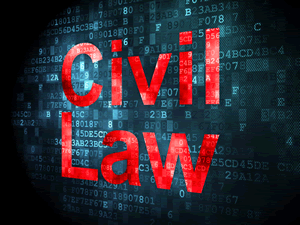Slipped and fell at Walmart. Can the store be held liable for my injuries?
Recently on our legal forum a user asked, “I went shopping the other day and went into the women’s restroom. There was water on the floor and I slipped and fell. I injured myself and I need to see a doctor. I am wondering if Wal-Mart has any liability in my accident. What do I do now?”
Premise liability law: what do you need to know?
Falls are very common in grocery stores and can occur for a variety of reason: someone has stacked something in the middle of the aisle, someone spills ketchup on aisle seven, the store fails to have sufficient signage, or there is insufficient lighting. Whether or not you have the right to seek compensation through a personal injury claim, however, will vary based on several factors.
When do I have a personal injury claim for a slip and fall?
Just because you fall down in a store and you are injured does not mean you have the legal right to sue the store. In fact, slip and fall cases, just like all personal injury claims, must meet certain legal standards and requirements.
First, to win an injury claim you must prove the store had a duty of care towards you. Because Wal-Mart is a public store and you legally have the right to be there, duty of care is generally easy to prove.
Next, you must prove that Wal-Mart breached their duty of care. Duty of care for a store like Wal-Mart means that they have the legal obligation to ensure their property is safe and free from hazardous conditions.
This is not the same requirement as eliminating every hazard on the property. It does mean, however, that if Wal-Mart knew or should have known that the property was unsafe and they did not take the necessary means to resolve the issue, then you could prove they were negligent and breached their duty.
Proving negligence for a spill or wet floor
So when would a wet floor in a store be considered a breach of duty? Let’s say for example that someone spilled something on the floor and Wal-Mart management was notified of the spill but it sat there for several hours and was not cleaned. This might be considered negligent, especially if you could prove that Wal-Mart did not have a regular cleaning schedule and they were notified of the spill.
If, however, a child dumped water on the bathroom floor, two minutes later you come and slip down, but Wal-Mart could prove that they consistently clean the bathrooms and they had a schedule to mop the bathroom floor every thirty minutes, this could be considered reasonable care in ownership and maintenance and the court may rule they were not negligent.
Proving Premise Liability Case for a slip and fall
Now, back to the elements of your injury claim. Let’s say for argument’s sake that you can prove duty and breach of duty. To win your claim you will also have to prove that you were injured from the fall and the breach was the proximate cause of the injury, and you were actually injured or suffered loss.
In your example this means that you will have to have evidence that your injuries were really sustained in the fall and that when you fell you really suffered an injury. Remember, if you are not injured or you do not suffer any loss, you do not have an injury claim.
Bottom Line:
If you slip and fell at Wal-Mart and you can prove duty, breach of duty, and injury from the breach, you may be entitled to compensation. Note, however, that if you are partially responsible for your own injuries your right to compensation may be reduced or eliminated.
If you win your personal injury claim for a slip and fall, however, you may receive payment for pain and suffering, current and future medical expenses, and current and future lost wages.
Related Pages
Previous Question
Seller failed to disclose issue with house. Can we sue them?Next Question
Statute of limitations for fines owed to the DMV?Latest Question
Guardianship for elder care
If you decide you should be the guardian of your parent and the court agrees, you will be responsible for a variety of decisions.
Category: Estate Law


